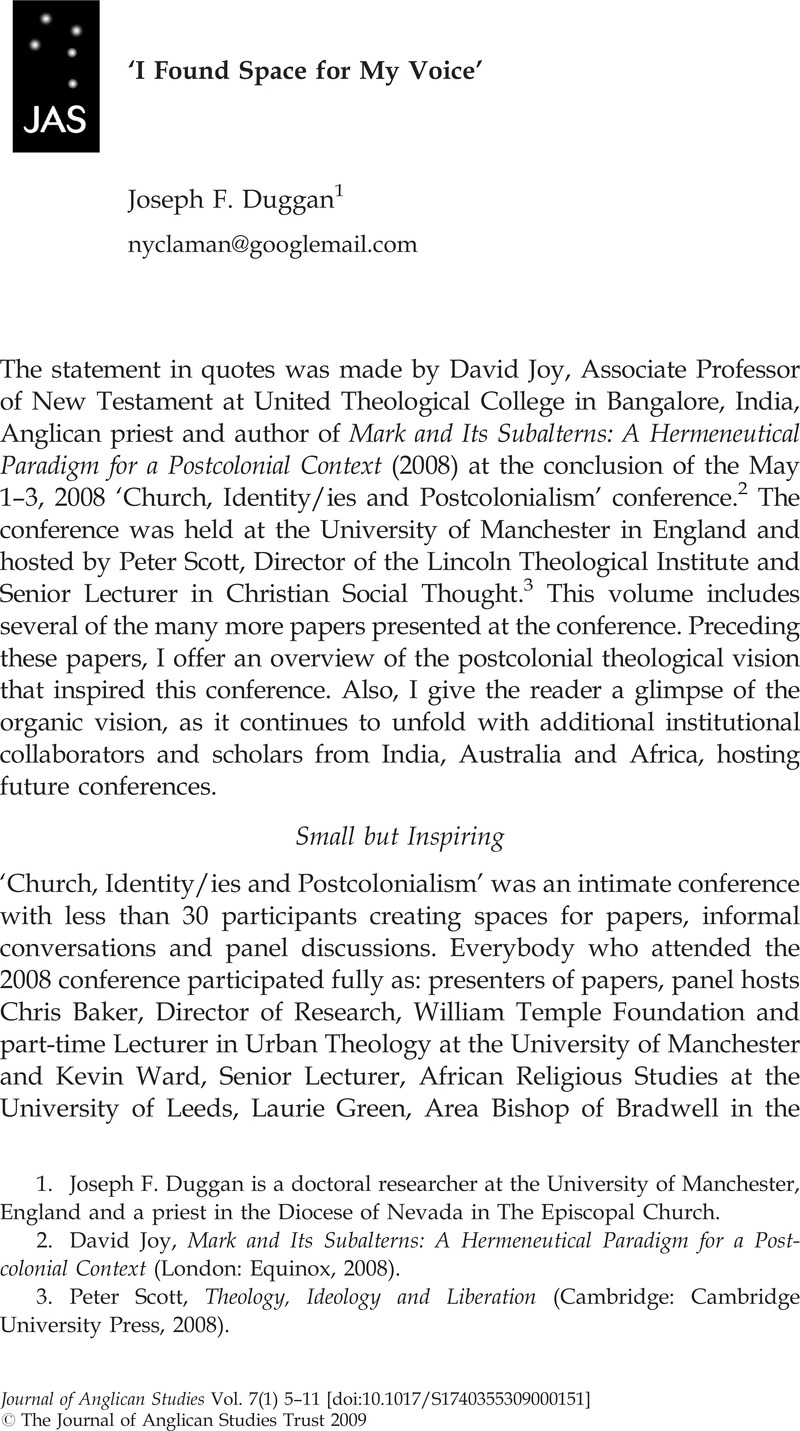No CrossRef data available.
Published online by Cambridge University Press: 01 May 2009

Joseph F. Duggan is a doctoral researcher at the University of Manchester, England and a priest in the Diocese of Nevada in The Episcopal Church.
2. Joy, David, Mark and Its Subalterns: A Hermeneutical Paradigm for a Postcolonial Context (London: Equinox, 2008).Google Scholar
3. Scott, Peter, Theology, Ideology and Liberation (Cambridge: Cambridge University Press, 2008).Google Scholar
4. Baker, Chris, The Hybrid Church in the City (London: Ashgate Publishing, 2007); Kevin Ward, A History of Global Anglicanism (Cambridge: Cambridge University Press, 2006); and Laurie Green, ‘Global Urbanization: A Christian Response’, in Ian T. Douglas and Kwok Pui-lan (eds.), Beyond Colonial Anglicanism: The Anglican Communion In The Twenty-First Century (New York: Church House Publishing, 2001).Google Scholar
5. Sugirtharajah, R.S., Postcolonial Reconfigurations: An Alternative Way of Reading the Bible and Doing Theology (St Louis: Chalice Press, 2003); Musa Dube, Postcolonial Feminist Interpretation of the Bible (St Louis: Chalice Press, 2000); and Fernando Segovia, Interpreting Beyond Borders (Sheffield: Sheffield Academic Press, 2000).Google Scholar
6. Pui-lan, Kwok, Postcolonial Imagination and Feminist Theology (Louisville: Westminster John Knox Press, 2005) and Catherine Keller, Michael Nausner and Mayra Rivera, Postcolonial Theologies: Divinity and Empire (St Louis: Chalice Press, 2004).Google Scholar
7. Segovia, Interpreting Beyond Borders, p. 12.Google Scholar
8. Matt Davies, ‘Colonial Legacies, Anglican Identities Addressed at pioneering conference in Manchester’, http://www.episcopalchurch.org/79901_96871_ENG_HTM.htmGoogle Scholar
9. Young, Robert J.C., Postcolonialism: A Very Short Introduction (Oxford: Oxford University Press, 2003); James Tengatenga, Church, State and Malawi: The Anglican Case (Zomba: Kachere Series, 2006); and Stephen Pickard, ‘Many Verandahs, Same House? Ecclesiological Challenges for Australian Anglicanism’, Journal of Anglican Studies 4.2 (2006), pp. 177–200.CrossRefGoogle Scholar
10. Sugirtharajah, R.S., ‘Complacencies and Cul-de-sacs: Christian Theologies and Colonialism’, in Keller, Catherine, Nausner, Michael and Rivera, Mayra(eds.),Postcolonial Theologies: Divinity and Empire (St Louis: Chalice Press, 2004), p.22.Google Scholar
11. Porter, Andrew, Religion versus Empire: British Protestant Missionaries and Overseas Expansion, 1700–1914 (Manchester: Manchester University Press, 2004), p. 13; Rowan Strong, Anglicanism and The British Empire (Oxford: Oxford University Press, 2008), p. 60; and Paul Avis, The Identity of Anglicanism (London: T&T Clark, 2008), p. 53.Google Scholar
12. Abraham, Susan, Identity, Ethics, and Nonviolence in Postcolonial Theory: A Rahnerian Theological Assessment (New York: Palgrave Macmillan, 2007).CrossRefGoogle Scholar
13. Brett, Mark, Decolonizing God: The Bible in the Tides of Empire (Sheffield: Sheffield Phoenix Press, 2008).Google Scholar